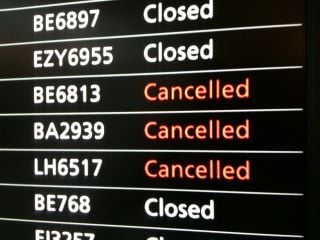This article is updated regularly, and the below status board is updated as storms develop.
Looking for status updates for changes for current sailings? Check our Hurricane Cruise Status Board
Video: Should You Cruise During Hurricane Season?
Frequently we associate cruising with relaxing in beautiful tropical weather. The fact is however, that tropical weather includes hurricanes and other severe weather systems, and June 1st marks the start of the Atlantic hurricane season. How do you plan for this if you want to take a cruise during peak hurricane season? From being flexible about your ports of call, weighing the benefits of travel insurance, and making sure your home is secure, we'll discuss the concerns and walk through how much of a problem this really is.

...remember, no cruise line, airline, or hotel wants to put guests in any danger, and they work really hard at making sure that doesn't happen.
Hurricanes can come about any time of the year, but in the Atlantic, they're most common during the official hurricane season, June 1st through November 30th, peaking in September. During this same period of time, however, hundreds of cruises set sail, while millions of people enjoy vacations in Florida and various destinations throughout the Caribbean without suffering the affects of a single hurricane or tropical storm. When a storm does come however, things change. Flights, cruise itineraries, and tours all have the potential of being changed or canceled. This brings up the first important point:
Be Flexible
Because ships can frequently route around bad weather, the most common effect that these storms have on cruises is that ports of call may be changed. This might mean going to your scheduled ports of call but in a different order, or visiting different ports entirely. For example, when first putting this info together in 2017, Oasis of the Seas was scheduled to visit the US Virgin Islands, and instead went to San Juan. While some passengers' plans had to be changed, they simply changed to another enjoyable and beautiful destination. You might also find that the destination isn't scheduled to change, but if you have to tender, rough waters from a nearby storm may mean you're in for a sea day instead. That in mind, if you're going on a cruise with the goal of visiting a specific destination, you may want to avoid taking that trip during hurricane season, or at least during its peak when your itinerary is more likely to be affected. Still, itineraries can change any time of the year.
Other changes however could be a bit more challenging. I always recommend that you fly into your port of embarkation a day early, but this becomes even more important with hurricane season. You can have all the changeable tickets, the best travel insurance, etc but none of that brings the ship back to you if you simply can't get to the port in time. Keep in mind that in some cases, storms can cause a domino effect and delay flights far from the areas suffering any bad weather. Booking your air through the cruise line's air/sea department can take a lot of the stress (and risk) out of the equation, and doesn't always come at a premium - on ocassion the line's air program can even be cheaper than booking on your own.
Consider Travel Insurance
Any insurance purchase is one to consider careful based on your own set of circumstances and risk tolerance. I personally don't always get travel insurance, but I certainly do for some trips. I also have additional coverage from my credit card. The biggest tip I can give here is to read the insurance policy before purchasing to understand what is and isn't covered. If you have a travel agent you trust, he or she can be a great resource. Review what circumstances a trip covers, the limits of that coverage, restrictions (such as all parts of the trip needing to be under the plan for anything at all to be covered), etc.
What to know when considering and shopping for trip insurance - Article & Video

Many people assume that they don't need travel insurance if their cruise vacation plans are impacted by a storm, and there is a big maybe there. Let's say a storm might be coming, and the cruise line lets you know that you can reschedule your cruise without penalty. You decide that you and your family will stay safely in Ohio for the time being. The cruise line let you cancel, but what about your airfare? Or maybe your cruise leaves out of Puerto Rico, and you're planning on spending a few days in South Florida before flying to San Juan to sail out? Your flight gets canceled into Puerto Rico because of a storm, but you had a totally separate flight getting you home from San Juan in a week. What happens then? These are instances where insurance can be a big help, but again, you must read and understand the policies first. Also know that just because you have travel insurance, this doesn't mean you can cancel a trip just because you've decided not to cruise while there is a storm in the area.
Related: Our video, Everything about Travel Insurance for Your Cruise
Make Sure Your Home Is Secure
If you live in a hurricane prone area, this one is for you, and I'll admit, I've failed to follow this piece of advice myself. While we usually have a good idea a week out that a storm might approach, we've been surprised before. So if you're leaving town for more than a couple of days, be sure you've taken a reasonable level of preparation at your home to reduce any potential damage, perhaps entrusting someone nearby to secure your home in the event of an emergency. This can mean brining patio furniture inside, ensuring important documents are in sealed containers, and perhaps even elevating and protecting computers or other valuable items in your home to avoid water damage.
What to Do If Your Cruise Is Affected by a Hurricane
When you checked in to your cruise you likely gave your contact information such as email addresses, cell phone numbers, etc. When a sailing your booked on in the coming days in affected in any way, the cruise line will reach out via these and other method of contact so that you're informed about any potential changes. Generally speaking, in the rare event a sailing is actually canceled, the cruise line will work out a refund or credit option. Remember though, that unless you booked your airfare and other transfers through the cruise line, you'll need to work with those third parties with regard to their particular cancelation or change policies. Also, this is dependent on the cruise line actually canceling the sailing, not you canceling your plans to go on a cruise that ends up sailing as planned. As a side note, if you do go on your cruise, and you think you may run into some rain on your tours, a good rain jacket will be worth it's weight in gold - especially on trips to ports that involved a lot of walking or hiking.
If you want to see how a major cruise line weathered a major storm, check out RoyalCaribbeanBlog.com's great article on Hurricane Andrew.
Just as in the article above about Hurricane Andrew, the greatest impact often comes when the port of embarkation is significantly impacted. In August of 2017 we saw this with Hurricane Harvey impacting the Galveston and Houston area, causing unprecedented damage. The port was closed for a week, and ships that had sailed out of Galveston had to resupply in Louisiana, Alabama, and even Miami, FL before heading back to Texas. While this tragedy impacted many, and certainly inconvenienced travelers, those on cruise ships during this time had the benefit of sailing out of harms' way, unlike those on land unable to avoid the path of the storm. Storms and subsequent incidents like this are however incredibly rare. In most cases port closures last only hours, and damages largely limited to convenience matters.
This Is Vacation Planning, Nothing More
Many of the considerations that have to do with planning a cruise during hurricane season are no different than the considerations you should take for all of your trips. In this way, remember that this is vacation planning, not survival training. There are always risks in the world, so plan your life, but don't avoid living it out of concern for that which can be safely mitigated. Hurricanes can be dangerous, but remember, no cruise line, airline, or hotel wants to put guests in any danger, and they work really hard at making sure that doesn't happen.


